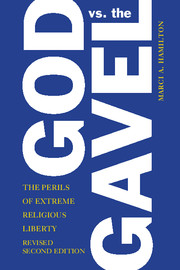Book contents
Introduction: The Wages of RFRA
Published online by Cambridge University Press: 05 November 2014
Summary
It has taken more than twenty years, but the American public is finally getting a true taste of the perils of extreme religious liberty. Finally, the Religious Freedom Restoration Act, or RFRA, and its progeny have emerged for what they are: a license for believers to assert rights to discriminate against homosexuals, abuse or neglect children, constrain a woman's right to choose, and force huge projects on residential neighborhoods and families. But RFRA is only a part of the extreme religious liberty problem, because lawmakers too often grant religious lobbyists and claimants privileges that let them harm others. Judges also blindly grant religious preferences on the basis of their own religious beliefs or on trial records that are misleading.
RFRA is evidence of an agenda of one-way accommodation, where the religious believer is the center of the universe and the rest of us are supposed to make way. Each one of us is, on this theory, a self-enclosed universe where our only obligations are to ourselves. It is a recipe for intolerance; self-centered practices; harm to children, women, and the vulnerable; and, ultimately, if permitted to fester, religious war. Do you know why we haven't had a religious civil war yet, like the rest of the world? Because we did not countenance extreme religious liberty until now.
- Type
- Chapter
- Information
- God vs. the GavelThe Perils of Extreme Religious Liberty, pp. 1 - 10Publisher: Cambridge University PressPrint publication year: 2014



